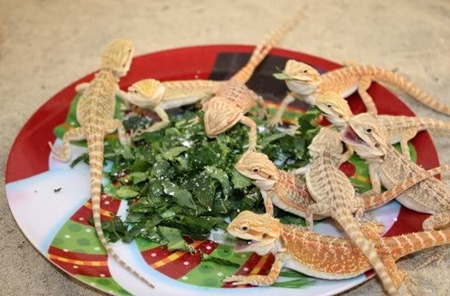Bearded Dragon Threw Up Superworms: What You Need to Know
Bearded Dragon Threw Up Superworms: What You Need to Know
Owning a bearded dragon can be a fun and rewarding experience. However, as a responsible pet owner, it is important to be aware of the potential health issues that can arise. One common concern for many bearded dragon owners is when their pet vomits, especially if they see superworms in the vomit.

Why Did My Bearded Dragon Throw Up Superworms?
Superworms are a popular food source for bearded dragons. They are high in protein and fat and are a great treat for your pet. However, if your bearded dragon eats too many superworms, it can lead to vomiting. This is because superworms are high in chitin, which is difficult for bearded dragons to digest. If your bearded dragon eats too many superworms, it can cause a blockage in their digestive tract which can lead to vomiting.
What Should I Do If My Bearded Dragon Throws Up Superworms?
If you notice that your bearded dragon has thrown up superworms, it is important to keep a close eye on them. In most cases, vomiting is a one-time event and your bearded dragon will return to their normal self. However, if your bearded dragon continues to vomit or shows other signs of illness, such as lack of appetite or lethargy, it is important to seek veterinary care.
- Remove any uneaten superworms from your bearded dragon’s enclosure.
- Monitor your bearded dragon for any additional vomiting.
- Check the temperature and humidity levels in your bearded dragon’s enclosure to ensure they are within the appropriate ranges.
- Offer your bearded dragon small amounts of water to help them stay hydrated.
- Consider adjusting your bearded dragon’s diet to avoid overfeeding on superworms.

Preventing Superworm Vomiting
To prevent your bearded dragon from vomiting after eating superworms, it is important to follow a few simple steps:
- Feed your bearded dragon a balanced diet that contains a variety of foods, including fruits, vegetables, and insects.
- Avoid overfeeding your bearded dragon on superworms. They should be given as a treat and not as a staple food source.
- Ensure that your bearded dragon’s enclosure is kept clean and hygienic to prevent the spread of bacteria and parasites.
Conclusion
Finding superworms in your bearded dragon’s vomit can be concerning, but in most cases, it is not a cause for alarm. However, it is important to be mindful of your bearded dragon’s diet and monitor them closely for any signs of illness. With proper care and attention, your bearded dragon can remain healthy and happy for many years to come.
